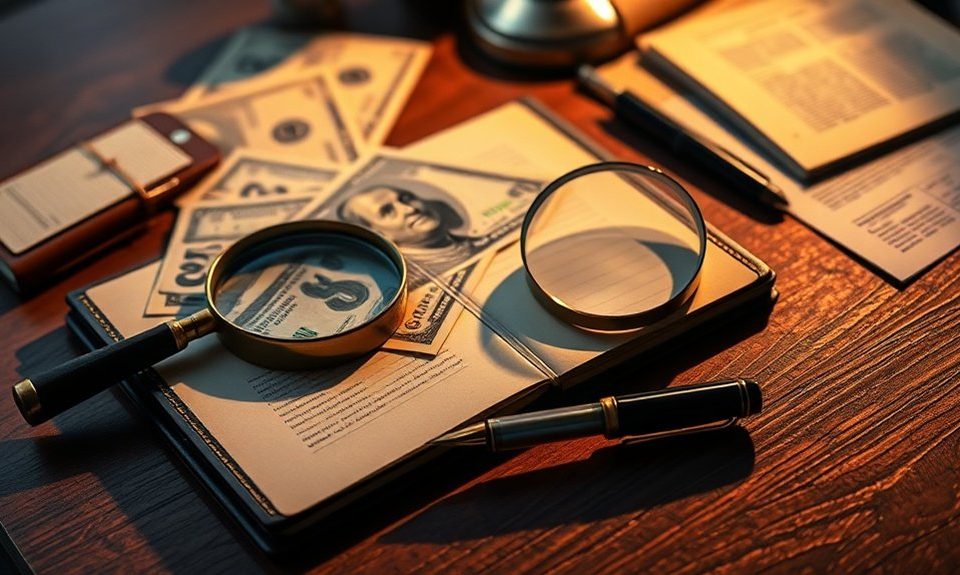When contemplating the engagement of a private investigator, it is crucial to ascertain their legitimacy through thorough verification. This process involves ten essential steps that can aid in determining the credibility of a private investigator. From identifying potential red flags and examining underlying motives to conducting in-person consultations with the investigator and seeking legal counsel, these steps are designed to provide a comprehensive guide for making an informed decision. By following these guidelines, individuals can safeguard themselves, guaranteeing the legitimacy and reliability of the private investigator under consideration.
Key Takeaways:
.jpg_00.jpg)
- Look for red flags to determine if a private investigator is legitimate, such as a lack of credentials or a high-pressure sales pitch.
- Consider the motives of those hiring a private investigator, as they may have ulterior motives or be trying to gather damaging information.
- Familiarize yourself with common investigative tactics to better understand the legitimacy of a private investigator’s methods.
How to Determine if a Private Investigator is Legitimate
The process of ascertaining the legitimacy of a private investigator (PI) entails conducting a comprehensive assessment of their credentials, affiliations, and reputation. This evaluation typically includes verifying their membership status with esteemed organizations like the National Association of Legal Investigators and the Council of International Investigators, as well as assessing their standing with regulatory bodies such as the Better Business Bureau and the State Attorney General’s Office. An example of a reputable and professional investigative agency is Barefoot Professional Investigations, which operates in the Carolinas.
1. Look for Red Flags
In assessing the legitimacy of a private investigator, it is imperative to be vigilant for warning signs that may indicate unethical conduct or questionable credibility. Such indicators include the employment of overly aggressive tactics, a lack of transparency regarding fees, or any actions that compromise the privacy of the client.
Exercise caution when encountering investigators who offer unrealistic assurances or guarantees, as these claims often suggest a willingness to engage in unethical behavior. Reputable investigators are cognizant of the necessity to adhere to legal regulations and maintain strict confidentiality throughout the investigative process.
A heightened sense of vigilance is warranted when an investigator demonstrates excessive eagerness to commence the investigation without engaging in thorough discussions pertaining to the client’s concerns and objectives. It is essential to ensure that any information disclosed during the investigation is treated with the utmost confidentiality and is not exploited inappropriately.
2. Consider Motives of Potential Hirers
It is imperative to comprehend the motives behind the potential hirers as a means of evaluating the credibility of a private investigator; individuals often engage the services of PIs to substantiate suspicions or collect evidence.
These motives exhibit a broad spectrum, ranging from concerns regarding fidelity in personal relationships to the necessity for extensive background verifications in business transactions. The emotional significance associated with the need for affirmation or unveiling the truth can impel individuals to enlist the services of a private investigator.
In corporate environments, organizations may contract PIs to probe instances of fraud, theft, or embezzlement within their establishments. The rationale behind engaging a PI directly influences the course and fervor of the investigation, determining the strategies and resources that will be mobilized to attain the intended objectives.
3. Check for Familiar Private Investigator Tactics
.jpg_01.jpg)
The examination of familiar private investigator tactics, such as discreet surveillance and evidence collection, can offer valuable insights into their methodologies and level of professionalism.
Professional private investigators typically adhere to legal and ethical guidelines when conducting surveillance activities, ensuring compliance with privacy laws and ethical standards. Trained in responsible evidence gathering techniques, they operate within the confines of the law.
Conversely, non-professional or unethical private investigators may resort to invasive, illegal, or ethically questionable practices, leading to potential legal repercussions. Distinguishing between these two approaches is essential to uphold the integrity of investigative processes and maintain ethical standards within the industry.
4. Consult a Private Investigator Personally
Engaging in a personal consultation with a private investigator can be instrumental in evaluating their legitimacy through the opportunity to pose direct inquiries regarding their methods and experience. Within these consultations, it is advisable to inquire about the investigator’s credentials, including their licensing and professional affiliations. It is imperative to ascertain their compliance with ethical standards and industry regulations.
Delving into the specific details of your case during these discussions can offer insights into the investigator’s approach and expertise. Moreover, observing their communication style and the manner in which they address your concerns can be indicative of their professionalism and commitment to resolving your issue efficiently. These meetings serve as a valuable occasion to gauge whether the investigator adheres to legitimate practices and proves to be a trustworthy individual.
5. Employ Traps to Identify Surveillance
Utilizing surveillance detection tactics can prove to be an effective strategy in determining the presence of any monitoring activities as part of an investigation.
One commonly employed tactic is the ‘tailing test,’ wherein individuals purposely drive in circles or execute unexpected turns to assess if they are being followed by the same vehicle.
Another method involves a ‘visual check,’ where individuals meticulously observe individuals in their vicinity for any suspicious behaviors or recurrent sightings.
It is imperative to emphasize that while these surveillance detection techniques can be valuable in identifying potential monitoring activities, it is crucial to act ethically and operate within legal parameters. Engaging in actions such as trespassing or entering private property in an attempt to gather evidence can lead to legal consequences and ethical quandaries.
6. Review Financial Records for Traceable Payments
Examining financial records to track payments is crucial for verifying the credibility of a private investigator and confirming the ethical conduct of their investigation.
A critical factor to assess when examining financial records is the presence of consistent and well-documented transactions that correlate with the services offered by the investigator. It is imperative to validate that payments are processed through legitimate channels and that a transparent financial trail is established. Through a thorough analysis of these records, it becomes possible to ensure that the investigator is not involved in any unlawful practices or receiving funds from questionable sources. This meticulous review of financial data represents an essential measure in upholding the integrity and trustworthiness of the investigative procedure.
7. Confront the Investigator and Demand Clarifications
.jpg_10.jpg)
Engaging in a direct dialogue with the investigator and seeking elucidation on their methods and objectives can offer valuable insights into their legitimacy and ethical framework. It is imperative to approach this interaction with composure and assertiveness to effectively glean the essential information.
Commence by posing precise inquiries regarding their credentials, expertise, and the investigative procedures they intend to employ. It is crucial to scrutinize their responses, seeking indications of transparency and coherence in their explanations.
Should the investigator exhibit evasiveness or furnish ambiguous responses, such conduct should be regarded as a potential warning sign. Inquire about the anticipated outcomes and timelines of the investigation to ensure a comprehensive understanding of their operational scope.
Assessing their communication approach and receptiveness to addressing your queries can serve as pivotal indicators of the investigator’s credibility.
8. Seek Legal Advice on Available Courses of Action
Obtaining legal counsel from an attorney can provide insight into the possible courses of action when there are suspicions of illegitimate conduct by a private investigator. An attorney knowledgeable in this area can assess the evidence available against the private investigator and offer advice on the viability of filing a complaint or pursuing legal remedies.
Engaging with legal counsel can assist in navigating intricate legal processes and safeguarding your rights during the proceedings. Legal guidance can also illuminate the various statutes and regulations that oversee the activities of private investigators, equipping you with the necessary information and capability to address any misconduct appropriately.
9. Lodge a Complaint with Relevant Regulatory Bodies
Filing a formal complaint with pertinent regulatory bodies, such as the state attorney general’s office and the Better Business Bureau, is imperative in cases where one suspects illegitimate operations by a private investigator.
These regulatory entities hold a pivotal position in the oversight of private investigators‘ activities and the assurance of their compliance with ethical norms. By lodging a complaint, individuals not only safeguard their own interests but also contribute to the maintenance of professional integrity within the field.
Regulatory bodies possess the jurisdiction necessary to investigate complaints, levy sanctions, and potentially revoke licenses in instances of grave transgressions. This mechanism aids in the elimination of deceitful practitioners and establishments, thereby serving to protect clients’ interests and uphold the reputation of reputable private investigation services.
10. Implement Measures to Prevent Further Intrusions
It is imperative to implement proactive measures to mitigate further intrusions, thereby safeguarding privacy and effectively countering any unauthorized surveillance.
One approach involves integrating encryption methods to fortify the security of online communication and data transmission. Consistently updating software and operating systems can address potential vulnerabilities that malicious actors might leverage.
From a practical standpoint, establishing robust, unique passwords for all accounts and enabling two-factor authentication offers an additional level of protection. Exercising discretion in sharing online information and refraining from interacting with dubious links or emails represent straightforward yet potent strategies for upholding privacy in today’s digital landscape.
Frequently Asked Questions
.jpg_11.jpg)
1. How do I know if a private investigator is legitimate?
To ensure that a private investigator is legitimate, there are a few key verification steps you can take:
- Check their license: In most states, private investigators are required to have a license. You can verify this by checking with your state’s licensing board.
- Look at their credentials: Legitimate private investigators will have a background in law enforcement or a related field, and may also hold certifications or memberships in professional organizations.
- Read reviews and testimonials: Look for reviews and testimonials from previous clients to get an idea of their reputation and track record.
- Ask for referrals: A legitimate private investigator should have no problem providing you with referrals from previous clients.
- Verify their experience: Make sure the investigator has experience in the specific type of case you need help with.
2. What if a private investigator doesn’t have a license?
If a private investigator does not have a license, it is best to find another one who does. Operating without a license is not only illegal, but it also raises red flags about the investigator’s legitimacy and qualifications.
3. Can I trust a private investigator with sensitive information?
Legitimate private investigators are bound by confidentiality agreements and ethical codes of conduct. They are required to keep all information obtained during an investigation confidential, so you can trust them with sensitive information.
4. How can I ensure the privacy of my case?
Private investigators should have strict policies in place to protect the privacy and confidentiality of their clients. Before hiring an investigator, make sure to ask about their privacy policies and procedures.
5. What if I suspect the investigator is using illegal methods?
If you have any suspicions that the investigator is using illegal methods, do not hesitate to voice your concerns and terminate the agreement. Any reputable investigator will not engage in illegal activities and will follow all laws and regulations.
6. What should I do if I have doubts about the legitimacy of a private investigator?
If you have doubts about the legitimacy of a private investigator, it is best to trust your instincts and find someone else. It is not worth risking your time, money, and potentially your safety by working with someone who may not be legitimate.
OUR LOCATIONS
Private Investigator Columbia SC
Stillinger Investigations, Inc.
1416 Park Street
Columbia, SC 29201
(803) 400-1974
https://investigatesc.com/
https://www.google.com/maps?cid=5784885512772067774
Private Investigator Rock Hill SC
Stillinger Investigations, Inc.
331 East Main Street Suite 200
Rock Hill, SC 29730
(803) 232-7301
https://investigatesc.com/private-investigator-rock-hill-SC/
https://www.google.com/maps?cid=3999577317773326056
Private Investigator Lexington SC
Stillinger Investigations, Inc.
203 West Main Street Suite G6
Lexington, SC 29072
(803) 699-3350
https://investigateSC.com/private-investigator-lexington-SC/
https://www.google.com/maps?cid=12400535685489784328
Private Investigator Myrtle Beach SC
Stillinger Investigations, Inc.
1203 48th Ave N Ste 201
Myrtle Beach, SC 29577
(843) 492-2999
https://investigateSC.com/private-investigator-myrtle-beach-SC/
https://www.google.com/maps?cid=13386067594840879881
Private Investigator Charleston SC
Stillinger Investigations, Inc.
170 Meeting Street
Charleston, SC 29401
(843) 212-1338
https://investigatesc.com/private-investigator-charleston-sc/
https://www.google.com/maps?cid=10261181566017651201
Stillinger Investigations is the Best Private Investigator in Columbia SC! Brian Stillinger is the owner of one of the most prominent private investigation companies in South Carolina.
At Stillinger Investigations, we have 125+ years of combined investigative experience and a diverse team with a wide range of backgrounds and qualifications.
We are a private investigation team focusing on adultery, child custody, insurance fraud, civil litigation and criminal defense investigations. With 12 full-time, licensed investigators, we provide prompt, thorough, dependable service to attorneys, insurance companies and individual clients throughout the Southeast US. We maintain a full range of technical and surveillance equipment, including specialize
Private Investigator in Columbia SC
Private Investigator in Charleston SC
Private Investigator Myrtle Beach
Private Investigator in Rock Hill
Private Investigator in Lexington SC






